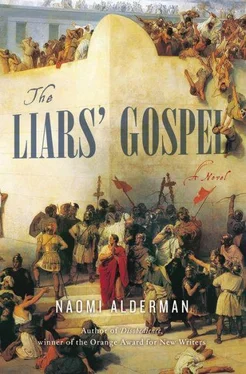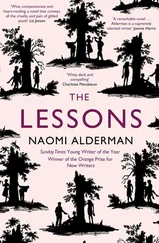She should have done it then, turned her heart into a stone. She should have said to herself, “My son is dead,” and begun to mourn him. As if it were possible. As if we can begin to mourn for a death a moment before it comes, as if we can grieve for any destruction before it arises. Even if we have known for a hundred years that it must be so. Nothing can be anticipated in grief — for if we could bring our sorrow forward, would we not mourn for a baby on the day of its nativity? She should have mourned for him then, on the day he was born.
It is the first day of Passover. This is the day, of course. She knows it down to her fingers’ ends. She has wondered how she would feel, but like the impact of an anticipated blow, contemplating it in advance cannot reduce the pain. Pinchas, her younger brother, knows it too. He has walked from S’de Raphael for the Passover feast. When he sees her, he makes a grimace at her and rises from blowing the embers of the fire. He puts his arm around her shoulders. His wool jerkin is damp, moss-scented. He pulls her close and says, “May your other sons live, Miryam! May they make you proud and bring you more grandchildren and great-grandchildren.” He kisses the top of her head and she nestles against his shoulder, pressing her nose into that mushroomy fabric. It feels safe here. Safe like family.
She sniffs and pulls away.
“Better get that fire going.”
He lets his hands fall to his sides.
“I still think about the ones Chava and I lost,” he says at last.
And she does too, and she understands. She still thinks often of her two that died, the little ones — lost at the pinnacle of their sweetness and grace to a cough and a chill and the simple fact that she could not keep them here. And those that never quickened, or that quickened but did not hold. She thinks of them and it is an ordinary sadness, the kind most parents share. But this particular thing is different. Perhaps it is only different because there is anger in it too.
“It’ll be like this all day,” she says. “The cousins and the aunts and the nephews and their wives.”
Pinchas shakes his head.
“Never. Some of them will forget.”
“The others will tell them.” Then, “Iov will remind them.”
“Has he still got that gossiping tongue? Like a woman at the market.”
She smiles. “Still.”
“So he’ll tell them, and they’ll wish you that your other sons live.”
This is how life continues. Learning to bear the unbearable.
Through the family feast Gidon watches and is mindful and says nothing. The family ask about him. She says, “He was lost in the mountains when the snow fell. He is staying here until he is well enough to make the journey home.” And they glance at him, looking his rangy form up and down, seeing that he appears quite well, and they say nothing. It is Passover, when it is especially meritorious to take in the stranger and the wanderer. Some of them remind her of what happened this time last year, and some say nothing. She finds they cannot make it harder for her either way. At least they do not ask about her husband. They are mostly concerned with tales of the soldiers still scouring the country for the last of the rebels from Yaffo. They are coming nearer to Galilee because their search has not been fruitful farther south. The family shake their heads and worry. They eat the unleavened bread and drink wine.
When she wakes the next morning, Gidon has completed his chores and has a soup bubbling on the fire. He is cutting some vegetables for it — onions and leeks.
He smiles. “One who helps a widow,” he quotes, “isn’t his portion doubled or tripled under heaven? And she who gives succor to an orphan will find herself blessed, and God will turn His face to her.”
She frowns. She thinks — I could tell him, and then he will know all my sorrow.
“I am not a widow,” she says. “As far as I know.”
Gidon’s hands stop working.
“He was angry with me. I disobeyed him too often. I was a stubborn wife, and people told him that I had disobeyed his wishes in…a certain matter. He put me away,” she speaks quickly and quietly, “he took another wife and moved her to another village. He gave me the keritut, the contract of divorce, and told me I was permitted to other men.”
She is not sorry he’s gone. Apart from the strength in his shoulders, she barely misses him. She wants her children close to her and she wants her son back, and Yosef and his new young wife seem the least of her concerns.
Gidon says nothing. He knows she has told him a sad and lonely thing. Most women in her position would lie and say that the husband was dead.
She heard that Yehoshuah preached a teaching which had never been heard before. Many of his teachings were not new. He told them well, and with a force and skill that impressed the listeners, but the teachings themselves were as familiar to her as her own skin.
She herself had taught him the famous story of Rabbi Hillel. A man came to the two great rabbis, Rabbi Hillel and Rabbi Shammai, and made of each of them the same request: “Teach me the whole of the Torah while I stand on one leg.” Rabbi Shammai chased him off with a broom. But Rabbi Hillel said: “Stand on one leg and I will teach you.” And the man stood on one leg. And Rabbi Hillel said: “That which is hateful to you, do not do to other people. That is the whole of the law: all the rest is commentary. Go and learn.”
When Yehoshuah said, “Treat others as you hope they’d treat you,” it was not a new teaching. Rabbi Hillel was an old man when Yehoshuah was born.
But he taught a new thing, one of the women from Kfar Nachum told her. He said that if a man divorces his wife and takes another, it is the same as adultery. This saying was popular among women. They passed it one to another. Every village had some woman whose husband had put her away, scraping a living in her old age on the goats and land their marriage contract made him give her, with no rest for her aching bones even though she had borne him sons and daughters.
She wondered if this was a secret message for her, a sign that he thought of her still. But he did not send word to her. He did not speak about Yosef. He talked of having another father, spoke of God as his father. And she thought: he wants me to go to him again. Surely this means he wants to see me.
It is a curious thing, the growth of trust between two people. When two strangers meet, there is no trust. They may fear one another. They do not know if one is a spy, or a traitor, or a thief. There is no dramatic moment which marks the transition from mistrust to trust. Like the approach of summer, it walks a little farther on every day, so that when we come to notice it, it has already occurred. Suddenly one notices that, yes, this is a person whom I would have watch over my flocks, my children, my secrets.
She is moved by the softness of Gidon’s features. His beard has hardly begun to come in, just a few patches of fuzz like a mountain dog in molt. His eyelashes are long, and his smell is the sweet thick scent of a young man in whom the sap is just rising. His elbows and knees are sharp, his shoulders are stiff. There is a wanting in him, and not yet an understanding of what he wants. Her son was just so when he was twenty. His tender eyes were just so. The way he holds the cup of warm liquid, cradling it close to him, rubbing his knuckles in the cold, he was just like this boy.
Her heart comes close to him. She says nothing more of her husband. For a long time, he says nothing more of her son. He works. They bank the fire down after the evening meal and talk of what could be done with the western field next year.
She went to Yehoshuah the winter before Gidon arrived in Natzaret. It was not such a harsh winter, there was no snow. She had heard that he had a mighty crowd of followers with him, perhaps five hundred people traveling in a great convoy. They were circling near to Natzaret, not half a day’s journey, and she left the littlest children with Shimon’s wife and wrapped woolen robes around her and borrowed a mule from Rahav and went to see her son.
Читать дальше












